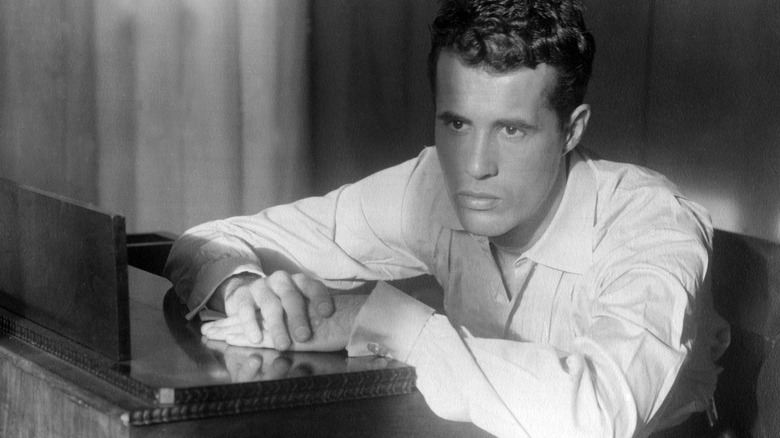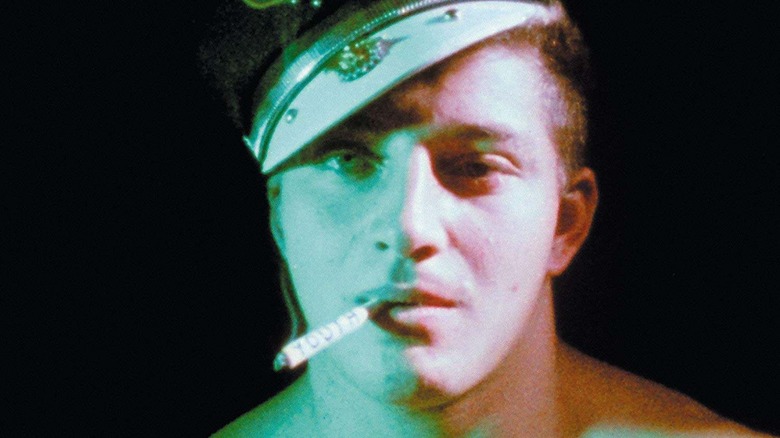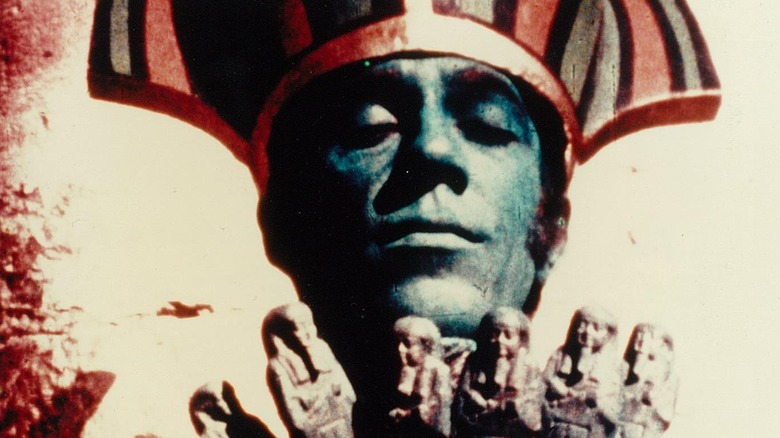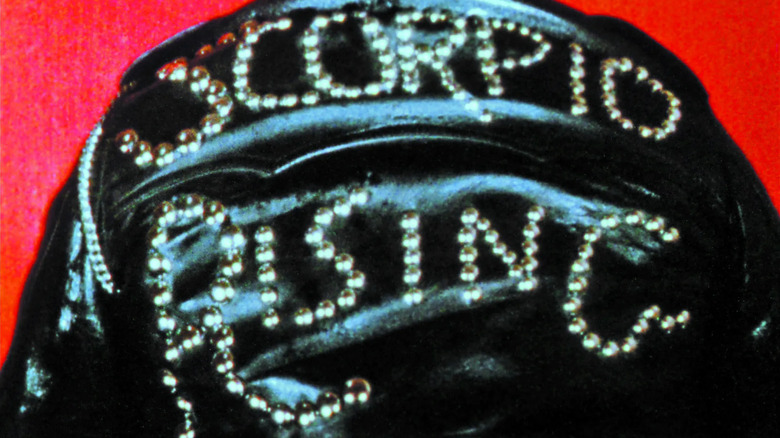Kenneth Anger, Underground Filmmaker And Author Of Hollywood Babylon, Has Died At 96
According to a report in Variety, pioneering experimental queer filmmaker Kenneth Anger, the director of seminal shorts like "Fireworks," "Rabbit's Moon," "Inauguration of the Pleasure Dome," and "Scorpio Rising," has died at the age of 96.
The news was announced on Anger's website by Monika Sprüth and Philomene Magers, the managers of Anger's art galleries (which are located in Berlin, London, New York, and Los Angeles). He had passed away on May 11, 2023, and the news was only just announced today.
Anger was a firebrand, an artistic rebel who aggressively and provocatively eschewed convention to present the world a new, cohesive type of underground, ultra-queer aesthetic that informs media and culture to this day. His shorts "Fireworks" and "Scorpio Rising" in particular blended traditionally ultra-masculine imagery — Naval officers, leather-clad bikers — with unapologetic gay lust, revealing the desire that exists so naturally in those worlds. Anger also blended images of queerness with religious iconography, tearing down conventional Christian morality, and introducing a new Whitmaneqsue body-based religion stemming from assertive hedonism. Without Anger, the closet would not have opened as quickly. We would have no John Waters.
Anger's use of popular music in his short films was revolutionary at the time. Anger would use songs like Bobby Vinton's "Blue Velvet" or Little Peggy March's "I Will Follow Him" to underscore and flavor his scenes of male bodies and sexuality in a way that re-contextualized the music. Prior to Anger's work, pop music was rarely interlocked with imagery in such a way. Anger's techniques are now a standard part of popular music cues in cinema. He more or less helped invent the very concept of the modern music video.
Hollywood Babylon
Despite his use of music in film, Kenneth Anger felt that making music videos was backward. In a 2000 interview, Anger said he refused to direct a music video for the band Combustible Edison because extrapolating a film out of music didn't make as much sense as inserting music into a movie.
Anger was also the author of the 1965 biography "Hollywood Babylon," a famously salacious book about celebrity sex habits in the 1950s. Anger collected all of the most exciting sexual rumors he had heard throughout Hollywood and compiled them into an extended, revealing tabloid that blew the lid off the decade's squareness. The book was highly criticized at the time and wasn't even made widely available in the United States for a decade. "Hollywood Babylon" was criticized for its exploitative nature — it boasted photographs of Jayne Mansfield's dead body for instance — as well as for its factual inaccuracies; Anger repeated false rumors about Clara Bow's sexual appetites and John Wayne's conquests.
Karina Longworth, on her valuable podcast "You Must Remember This," fact-checked and debunked most of the claims Anger made in "Hollywood Babylon." Despite the book's brazen rumor-mongering, Anger wrote a sequel in 1984 called "Hollywood Babylon II." In a 2010 interview with the Guardian, Anger claimed that he had completed a "Hollywood Babylon III," but that it was blocked from being published by the Church of Scientology, a body he openly criticized in the work. As of 2023, the book still hasn't been seen.
While Anger didn't create tabloid culture, his contributions to it shaped the way we view celebrities. Anger riffed on exploitation, discarding the niceties of a culture that was clearly trying to dig into the salacious details anyway. He wielded rumors the same way a B-filmmaker might use fake blood.
Lucifer Rising
Kenneth Anger was often, as his name might imply, a feisty and resentful individual, and he famously resented Andy Warhol's fame, notably in the underground art world. According to Bill Landis' 1995 book "Anger: The Unauthorized Biography of Kenneth Anger," the artist threw paint on Warhol's front door. Anger hobnobbed with celebrities and became friends with J. Paul Getty and the Rolling Stones in the mid-'60s. With their help, he made the 1972 short "Lucifer Rising," with music by Mick Jagger.
"Lucifer Rising" was emblematic of Anger's religious views, particularly as they pertained to Satanism. Anger was famously good friends with Anton LaVey, the founder of the Church of Satan, and was godfather to LaVey's daughter. Anger often spoke of the occult and occult imagery, and belonged to the Ordo Templi Orientis, a Thelemic order that drew its power from Lucifer and other body-based philosophies. He felt that Thelema's precepts were the masculine counterbalance to Wicca's feminine powers. A lot of Thelemic and Satanic imagery appeared in his films, notably "Lucifer Rising," which told the story of a young Lucifer in ancient times.
Anger bandied about with potentially controversial images a lot, and one will see crucifixes and swastikas all over "Scorpio Rising." He used cinematic images to draw parallels between God, Satan, fascism, sex, queerness, and a general culture of lust.
In 1999, Anger announced his retirement but didn't retire. He continued to make shorts for another decade, each one criticizing aspects of popular culture and establishment hypocrisy. He lambasted Disney in 2005's "Mouse Heaven." He made "Don't Smoke That Cigarette!" in 2000. It was his longest film, running 45 minutes.
Anger's Influence
No modern filmmaker hasn't been influenced by Kenneth Anger, and directors like Martin Scorsese and David Lynch have cited his works as revolutionary. According to The Hollywood Reporter, Scorsese saw "Scorpio Rising" as a young man in the late 1960s, and was moved to make his own Anger-like short, "The Big Shave," in 1967. Scorsese has famously also used pop music cues throughout his work, a technique he cribbed directly from Anger. Lynch, meanwhile, spun Anger's needle-drop of "Blue Velvet" into a whole film with the same title. Lynch's 1986 feature "Blue Velvet" is a child of Kenneth Anger through and through.
Have you ever wondered where the bulk of queer imagery in "The Rocky Horror Picture Show" came from? Watch "Scorpio Rising," and all the pieces will seem to fit into place. "Rocky Horror" sprung directly from the primordial pool that Anger created by sheer strength of will. By extension, one can even see Anger's influence on the very notion of a modern midnight movie scene.
Throughout his filmmaking career, Anger struggled to find financing, which is understandable, given the confrontational, pointed anti-Hollywood nature of his films. Thanks to his constant association with celebrities, both notorious and mainstream, Anger has remained a name filmmakers and cinema enthusiasts continue to speak in reverent whispers. There was an impressive 2-DVD set of Anger's works released in the 2000s, which is now sadly out of print. Enterprising students may be able to find some of his shorts online.
Rest in peace, Kenneth Anger.



